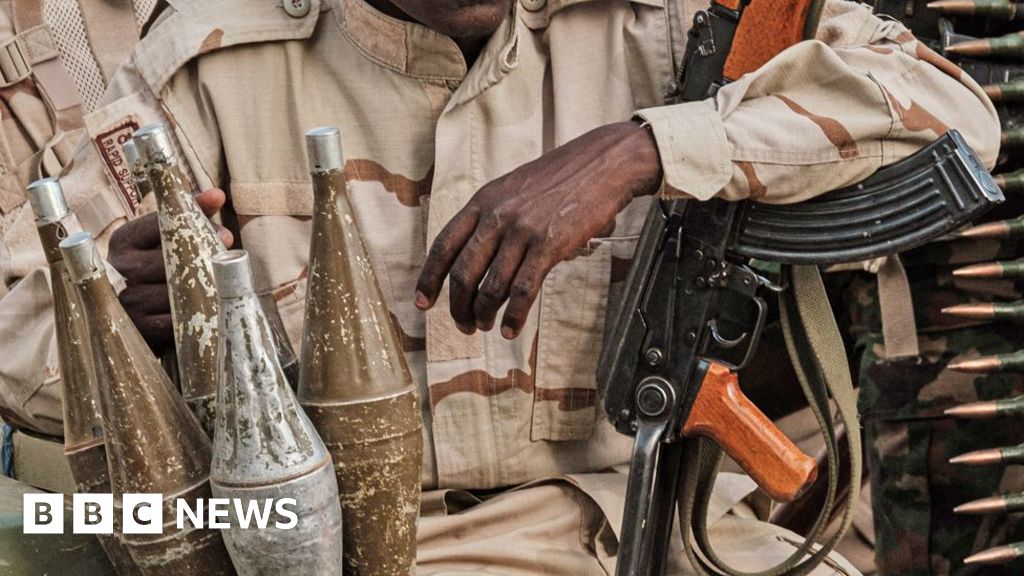Drone strike hits funeral in Sudan, killing many mourners

Drone Strike Kills Dozens at Funeral in Sudan, Raising War Crimes Concerns
At least 40 people have been killed in Sudan after a drone strike targeted a funeral procession outside the army-held city of El-Obeid, North Kordofan state, according to officials and activists. The attack, which occurred on Monday in al-Luweib village, has been attributed to the paramilitary Rapid Support Forces (RSF), although the RSF has yet to issue a statement.
The incident has sparked renewed condemnation of the ongoing violence in Sudan, with concerns mounting over potential war crimes and a rapidly escalating humanitarian crisis. The strategic importance of El-Obeid, which connects the capital Khartoum to the conflict-ridden Darfur region, underscores the severity of the situation.
RSF Accused of Atrocity as Fighting Intensifies
Reports indicate that many of the victims died en route to hospitals in El-Obeid. The attack comes amid intensified fighting in the oil-rich Kordofan area, with approximately 20,000 people fleeing to El-Obeid last week after the RSF captured Bara town, located 30km north of the city. Bara's fall coincided with the capture of El-Fasher, the army's last stronghold in Darfur, leading to reports of mass killings, sexual violence, abductions, and widespread looting allegedly perpetrated by RSF fighters.
The United Nations has reported summary executions of civilians by RSF fighters in Bara. These allegations have drawn strong condemnation from the International Criminal Court (ICC), which has warned that such atrocities could amount to war crimes and crimes against humanity.
Historical Context and Escalating Humanitarian Crisis
The current conflict stems from long-standing tensions between the Sudanese army, led by General Abdel Fattah al-Burhan, and the RSF, commanded by Mohamed Hamdan Dagalo, also known as Hemedti. The two forces jointly overthrew Omar al-Bashir in 2019, but their power-sharing agreement collapsed in April 2023, triggering the current civil war. The roots of the RSF can be traced back to the Janjaweed militias, which were implicated in the Darfur conflict in the early 2000s. Accusations of ethnically motivated violence against non-Arab populations continue to plague the RSF.
The fighting has exacerbated an already dire humanitarian situation. A recent assessment by the UN-accredited Integrated Food Security Phase network (IPC) confirmed that El-Fasher residents are suffering from famine following an 18-month siege by the RSF. The IPC also reported that the city of Kadugli in South Kordofan state is experiencing catastrophic levels of hunger, with the city similarly surrounded and deprived of supplies by the RSF.
Expert View: The Conflict's Regional Implications
"The situation in Sudan is not just a domestic crisis; it has significant regional implications," explains Dr. Fatima Hassan, a Sudanese political analyst at the University of Khartoum. "The instability is spilling over into neighboring countries, exacerbating existing tensions and creating new security challenges. The international community needs to adopt a more proactive approach, focusing not only on humanitarian aid but also on addressing the root causes of the conflict and promoting inclusive political dialogue."
Failed Peace Talks and International Pressure
UN Secretary-General António Guterres has called for an immediate cessation of hostilities, emphasizing the rapidly deteriorating humanitarian situation. "The horrifying crisis in Sudan... is spiralling out of control," he stated, highlighting the suffering in El-Fasher and surrounding areas. Guterres urged both the army and the RSF to return to the negotiating table to end the violence.
While a Sudanese government source indicated that authorities are considering a US proposal for a truce, previous rounds of peace talks in Saudi Arabia and Bahrain have failed to produce a lasting ceasefire. Both sides have demonstrated a reluctance to compromise, hindering efforts to achieve a peaceful resolution.
Washington, along with other international actors, continues to push for a ceasefire and a roadmap towards ending the conflict. However, the deep-seated mistrust and competing interests of the warring parties pose significant obstacles to achieving lasting peace.
Civilian Suffering and Humanitarian Catastrophe
The North Kordofan Resistance Committee, a local volunteer aid group, confirmed the attack on al-Luweib village, located 15km east of El-Obeid. Mohamed Ismail, North Kordofan's humanitarian aid commissioner, described the attack as a deliberate targeting of civilians attending a funeral.
Since the outbreak of the civil war in April 2023, over 150,000 people have reportedly died, and approximately 12 million have been displaced, making it the world's largest humanitarian crisis, according to the UN. The ongoing violence, coupled with widespread food insecurity and the collapse of essential services, paints a grim picture of the future for Sudan.
Analytical View: The Need for Accountability
According to legal scholar Dr. Omar Mahmoud, an expert in international criminal law at the African Union, "The repeated reports of atrocities committed by both sides in the Sudan conflict underscore the urgent need for accountability. The ICC's investigation is crucial, but it must be complemented by national and regional efforts to document and prosecute war crimes. Without accountability, there can be no lasting peace or reconciliation in Sudan."
Originally sourced from: BBC News Africa
